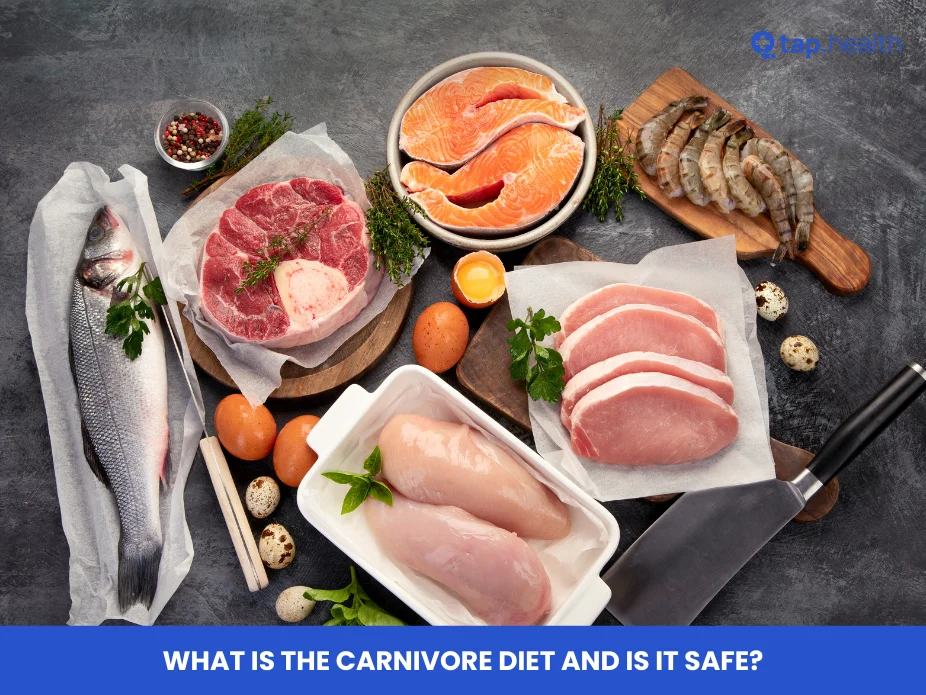The Carnivore Diet has recently gained a lot of attention in the world of health and fitness. It’s a unique, high-protein, low-carb eating plan that eliminates almost all plant-based foods and focuses exclusively on animal products. While some people swear by it, others have raised concerns about its long-term safety.
But what exactly is the Carnivore Diet, and is it really a healthy option? In this blog post, we’ll dive deep into what this diet involves, its potential benefits, risks, and whether it’s safe for your overall health. By the end, you’ll have a clear understanding of this controversial diet and whether it’s worth trying.
What Is the Carnivore Diet?
The Carnivore Diet, also known as the all-meat diet, is an extreme version of a low-carb, high-protein eating plan. As the name suggests, it involves eating only animal-based foods—primarily meat, fish, eggs, and limited dairy. The diet eliminates all fruits, vegetables, grains, legumes, and even nuts. In essence, if it’s not an animal product, it’s off the table.
Key Principles of the Carnivore Diet:
- Focus on animal products: Meat, fish, eggs, and some dairy are the only food groups allowed.
- No plant-based foods: Vegetables, fruits, grains, legumes, and processed plant-based foods are avoided entirely.
- High protein and fat: Meals primarily consist of protein and fat, with little to no carbohydrates.
Proponents of the Carnivore Diet believe it leads to numerous health benefits, including weight loss, better mental clarity, reduced inflammation, and even relief from certain chronic conditions. However, due to its restrictive nature, it’s important to look at both the positive and negative aspects before jumping in.
Potential Benefits of the Carnivore Diet
While this diet might sound extreme, some people report positive effects from adopting the Carnivore Diet. Let’s explore some of the potential benefits that have been discussed by followers and researchers.
1. Weight Loss
One of the primary reasons people try the Carnivore Diet is for weight loss. Since the diet eliminates carbohydrate-rich foods, the body enters a state called ketosis, where it starts burning fat for energy instead of carbohydrates. This can lead to significant weight loss in the short term.
Additionally, protein is highly satiating, meaning that you may feel fuller for longer, leading to a natural reduction in calorie intake.
How It Works:
- Eliminates processed foods: The Carnivore Diet eliminates many processed foods that contribute to weight gain, like sugary snacks, pastries, and even grains.
- Higher fat and protein intake: These macronutrients can help reduce hunger and control appetite, leading to fewer cravings.
2. Mental Clarity and Focus
Some followers of the Carnivore Diet claim that eliminating carbs helps clear brain fog and increases mental focus. By reducing carbohydrate intake and increasing fat intake, the body becomes more efficient at producing ketones, which can serve as an alternative fuel source for the brain.
How It Works:
- Brain-boosting fats: The fat content in meat and fish provides omega-3 fatty acids, which are essential for brain health.
- Stable blood sugar levels: With no sugar spikes and crashes from carbs, many people experience sustained energy and focus throughout the day.
3. Reduced Inflammation
Proponents of the Carnivore Diet suggest that eating only animal products reduces inflammation in the body. Some people with autoimmune conditions, such as rheumatoid arthritis or Crohn’s disease, have reported a reduction in symptoms after following this diet for a period of time.
How It Works:
- Eliminating inflammatory foods: Many plant-based foods, particularly grains and legumes, can be inflammatory for certain people, especially those with digestive issues.
- Anti-inflammatory fats: Omega-3s found in fatty fish like salmon may help reduce inflammation in the body.
4. Improved Digestion
Since the Carnivore Diet eliminates foods that are hard to digest (like fiber from plants), many people report better digestive health. Those who have gut sensitivities or irritable bowel syndrome (IBS) may find relief from symptoms such as bloating, gas, and discomfort.
Potential Risks of the Carnivore Diet
While the Carnivore Diet may offer short-term benefits, it’s important to consider the long-term risks before committing. This diet is highly restrictive, and eliminating entire food groups can create nutritional imbalances.
1. Nutrient Deficiencies
By cutting out all plant-based foods, the Carnivore Diet may lead to nutrient deficiencies. Key vitamins and minerals typically found in fruits, vegetables, and grains, such as vitamin C, fiber, and potassium, are completely excluded. This can lead to deficiencies over time, particularly if the diet is not carefully planned.
Key Nutrients at Risk:
- Vitamin C: Important for immune function and collagen production. Lack of this vitamin can lead to scurvy, though some carnivore followers argue that the body produces enough on a meat-based diet.
- Fiber: Essential for digestive health and preventing constipation. Without fiber, some people experience digestive issues, including constipation.
- Potassium and Magnesium: Crucial for heart and muscle function, often found in fruits, vegetables, and legumes.
2. Heart Health Concerns
The Carnivore Diet is high in saturated fats, which may raise concerns about heart health, particularly for individuals who are predisposed to high cholesterol or cardiovascular issues. The American Heart Association advises limiting saturated fat to reduce the risk of heart disease, but the Carnivore Diet encourages high-fat, animal-based foods.
Potential Issues:
- High cholesterol: Excessive intake of saturated fats can lead to an increase in LDL cholesterol, which has been associated with an increased risk of heart disease.
- Long-term risks: Research on the long-term effects of a high-fat, all-meat diet is limited. For some individuals, this type of diet could lead to an increased risk of heart disease, liver issues, or kidney strain.
3. Kidney Strain
Consuming large amounts of animal protein can put additional strain on the kidneys, especially for individuals with pre-existing kidney conditions. High protein intake increases the need for the kidneys to filter out excess nitrogen waste from protein metabolism.
4. Social and Lifestyle Challenges
The Carnivore Diet is highly restrictive and can be difficult to maintain, especially in social situations. Eating out, attending parties, or simply cooking at home can become challenging when you are limited to only animal-based foods.
Real-Life Scenarios
Scenario 1: Samantha’s Weight Loss Journey
Samantha, a 32-year-old woman, struggled with weight loss for years. After trying multiple diets, she decided to try the Carnivore Diet. In just two months, she lost 15 pounds, felt more energized, and noticed less bloating. Samantha was able to stick with the diet by focusing on high-quality meats like grass-fed beef, pork, and wild-caught fish. While she loved the results, she made sure to supplement her diet with vitamin C and other nutrients to avoid deficiencies.
Scenario 2: Tom’s Digestive Relief
Tom had been diagnosed with irritable bowel syndrome (IBS), which made it hard for him to enjoy meals without experiencing bloating, discomfort, and pain. After speaking with his doctor, he tried the Carnivore Diet. After several weeks, Tom noticed that his digestive issues improved. The absence of fiber-rich foods allowed his gut to heal, and he experienced fewer flare-ups. However, he regularly monitored his health and worked with a nutritionist to ensure he was getting enough nutrients.
Expert Contributions
Dr. Shawn Baker, an advocate of the Carnivore Diet and orthopedic surgeon, has stated, “The Carnivore Diet can have profound benefits for many individuals, particularly those dealing with chronic inflammation and autoimmune diseases. However, like any diet, it should be done carefully and under supervision to ensure you’re meeting all of your nutritional needs.”
Source: Shawn Baker, MD – The Carnivore Diet
FAQs on What Is the Carnivore Diet and Is It Safe?
1. Is the Carnivore Diet safe for everyone?
While many people report benefits from the Carnivore Diet, it’s not safe for everyone. Individuals with kidney disease, heart conditions, or certain autoimmune disorders should approach this diet with caution and consult a doctor before starting.
2. Can I get enough vitamins on the Carnivore Diet?
The Carnivore Diet can lead to vitamin deficiencies, particularly vitamin C, fiber, and potassium. If you follow this diet, consider supplementation or carefully plan your meals to include nutrient-dense animal products like organ meats.
3. How long should I follow the Carnivore Diet?
The Carnivore Diet is highly restrictive, and experts recommend it as a short-term diet rather than a long-term lifestyle. If you’re considering this diet, it’s important to monitor your health closely and consult a healthcare provider for long-term advice.
References:
- Shawn Baker, MD. The Carnivore Diet Link to Book
- Mayo Clinic. “Protein and Heart Health.” Link to Mayo Clinic



